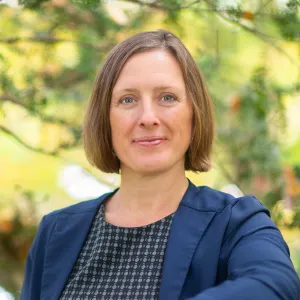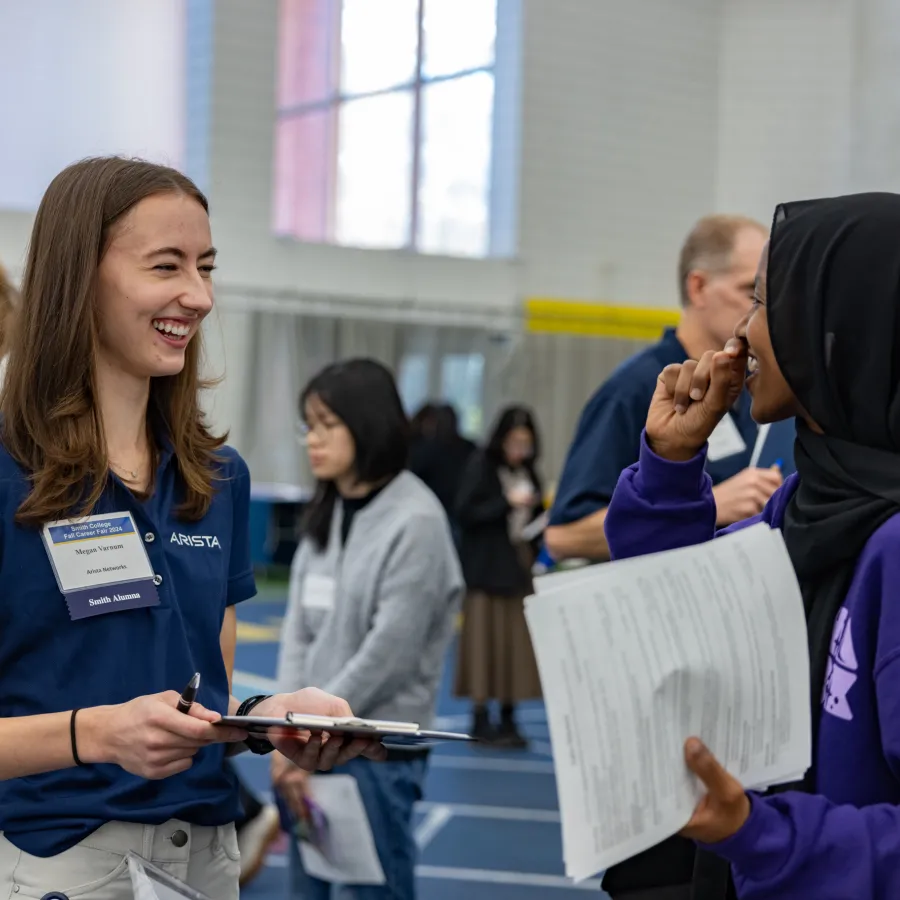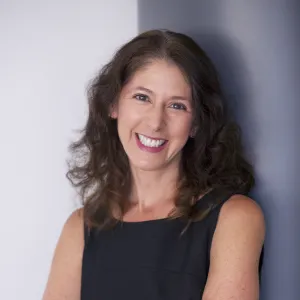Taking the ‘Next Practical Step’
Research & Inquiry
Smith’s career development program is helping students navigate job market uncertainty
Megan Vernum ’24 (at left), a software engineer at Arista Networks, recruiting at last year’s Lazarus Center career fair on campus. Photo by Jessica Scranton.
Published August 4, 2025
With major reductions to the federal workforce, the elimination of research grants, and cuts to international aid programs, it’s understandable that Smithies are anxious about the job market.
Fortunately, the college’s Lazarus Center for Career Development has the expertise and resources to help students feel more confident about taking what Dean of Career Development Faith McClellan calls “the next practical step” on their career paths.
“Our students have access to our center’s resources on demand throughout the year, and through five years post-graduation,” she says. “So they can come to us with questions any time they need help in planning that next step.”
McClellan says it’s more important than ever for students to leverage their Smith networks, including the more than 2,100 alums from a variety of professions who have signed up with the Smith Career Connect platform to coach and mentor students. “Now is a critical time for that,” she says.
Faculty are another key resource, says Alex Keller, vice president for campus life and dean of the college, noting that more than a third of full-time faculty are actively engaged with the Lazarus Center in hosting programs, connecting with alums, and working with career advisers.
“There is a real understanding from more and more of my colleagues that the Lazarus Center is a vital partner in taking the liberal arts education we offer and amping it up into whatever comes next” for students, says Keller, who is a professor of film and media studies.
Here’s what else McClellan and Keller had to say about how career development programs at Smith are helping students chart their career course in these uncertain times.
What are the biggest recent changes you’ve seen in the career landscape?

Faith McClellan: “In places like government policy and international affairs, there are direct cuts, as well as hiring and research freezes. In other places, such as in the diversity, equity, and inclusion space, there are these as well as more indirect cuts and adjustments. So, work may still be happening in certain corporate settings, but under a different name. Part of what we’re doing is offering navigation support for students, helping them understand that opportunities still exist, but they may need to be found in different ways. Our international students are facing a host of other barriers, both in domestic internships and the post-graduation global economy.”
What impact is AI having on the job market?
FM: “AI is dramatically shifting the job search process and the application process. Students need tools for how to navigate that effectively and ethically. A central message that we are trying to convey is that in this rapidly shifting economy, networking is more important than ever. Getting students to use our Smith Career Connect platform to engage with the thousands of alums who have volunteered to help is a critical place to start.”
How do you help students adjust their plans and expectations in response to a changing career climate?
FM: “We know it’s very important for students to pace themselves, to focus on self-care and peer and mentor support. We know that it’s important for students to do some rethinking and focus on the work and not a particular industry. So, for example, students might still be able to do important policy work with a social impact nonprofit instead of in government. And we know that it’s really critical for students to stay agile and adaptable, which means using this moment to explore things like upskilling through certifications or micro-internships or shorter-term opportunities. Just putting one foot in front of the other and committing to a next step is still sound advice.”
How do you help students differentiate between short-term upheaval and long-term changes in the job market?
FM: “Students are very aware that this is an uncertain economic time. In that way, this moment is not unlike the shifts that occurred during the 2008 recession or after COVID-19. What we say to students is that they are entering not just a current market, but really a lifetime of rapid change and uncertainty. What’s needed is resilience and agility to adapt to what will change in the next couple of years—and also to what will realistically be changing throughout their lifetimes.”
What are some examples of programs you’ve sponsored recently for students?
FM: “In the government, law, and policy arena, we had a really great alum panel event that was packed because students were so eager to hear from alums who’ve been working in government and policy about how they are navigating their own job situations. We also talked about ways to follow the shift in funding streams from government to foundations.
“Our programming structure allows us to be nimble and adaptable to student needs. For example, through Smith Career Connect, students can post questions about a particular profession that can organically lead alums to volunteer to host discussions and to problem-solving within the community. “Another example is that many students come to us for skills training in this moment to boost their resumes. We’ve responded through a partnership with LinkedIn Learning that offers customized skill-building pathways for students across our career communities. We see very strong interest in emerging fields like artificial intelligence, cybersecurity, and design. In the arts, we see a desire for user-experience design skills, and in the social sciences, for things like conflict resolution or mediation. Across the board we see a desire for project management skills.”
Alex Keller: “The Lazarus Center team has also made extraordinary strides in getting students to engage with the center as early as possible—from the moment they get here and preferably, even before. When students commit to Smith, the goal is to make them aware of Lazarus and connected to Lazarus. Teaching someone to pivot—ideally, you want to give them four years to practice those skills as they are moving through their liberal arts education.”
How do you help students leverage their liberal arts training when launching careers?
AK: “Career readiness is an amplification of the liberal arts because it prepares students with the human-centered skills that are fundamental to our wellbeing. We want our students to have the skills and capacities of mind to engage in meaningful work, in good jobs, and to feel that they are contributing to the greater good.”
FM: “We know that learning in the classroom and learning through work are inherently connected and that students rely on us to make those connections. Through our endowed Praxis program, which offers more than $1 million in funding each year, we’re proud to fund internships for any student at least once in their time at Smith. More than that, we are working to strengthen the ties between internship experiences and specific skill-building initiatives—for example, moving a student from an internship into a certification program in an area like graphic design or basic coding.”
AK: “How one connects a student to opportunities has become more complex, and the staff at the Lazarus Center has risen to meet the moment. We’re a women’s liberal arts college with a diverse population and a diverse set of desires about what students want to learn. Whatever that is—and it’s different for every student—that’s what Lazarus wants to help meet.”

